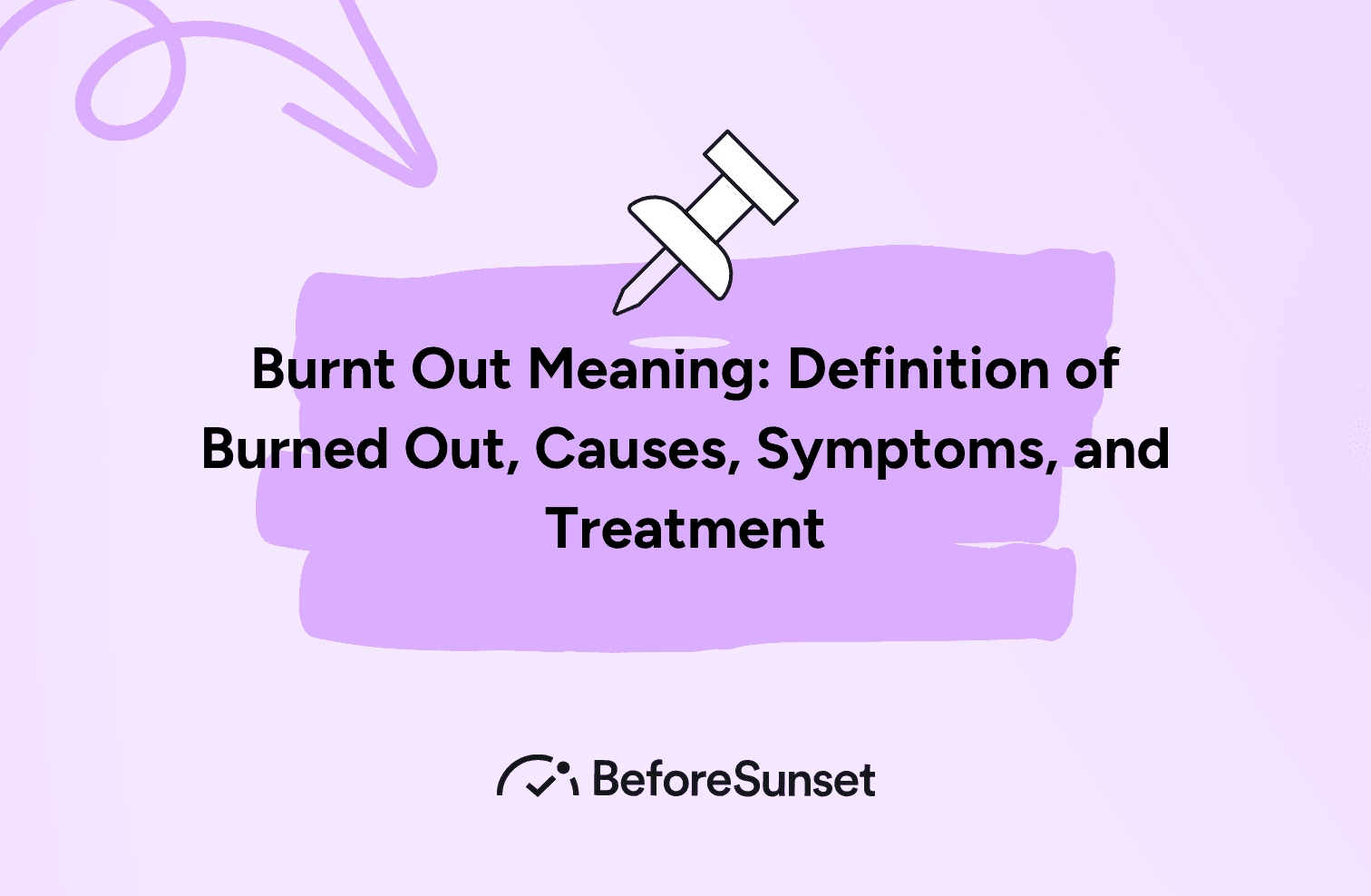Burnout is a physical, emotional, and mental weariness induced by continuous and excessive stress. It is a widespread and significant problem that can harm both individuals and organizations. Physical tiredness, emotional exhaustion, alienation or cynicism, and decreased productivity are all symptoms of burnout.
Burnout can occur in any type of job or personal circumstance, but it is especially common in people who have a lot of responsibility or work in stressful environments. It is critical to comprehend the meaning and implications of burnout in order to properly prevent and manage it.
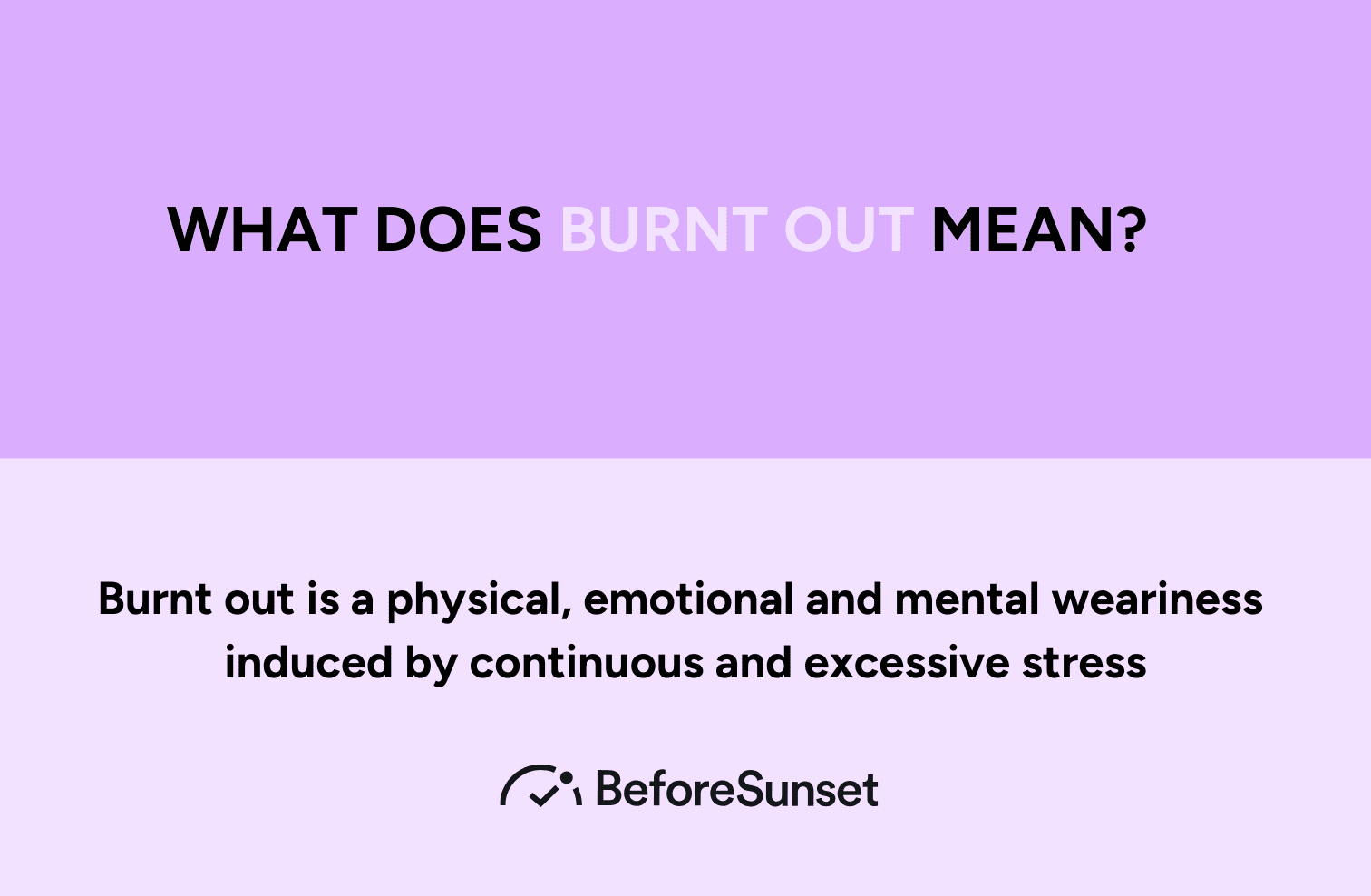
Blogs you might enjoy:
How to Get Back To Work When You Have No Motivation At All
Doing the Opposite of Procrastination: Learn How to Cope With It Professionally
How to Get Back To Work When You Have No Motivation At All
What Is Burn-Out?
Burnout is a condition of extreme and protracted stress-related physical, emotional, and mental depletion. It frequently manifests as cynicism, detachedness, and diminished productivity. Burnout can happen in any kind of professional or personal setting, but it is more prevalent among people who have a lot of responsibility or work in high-stress settings.
Psychoanalyst Herbert Freudenberger originally used the term "burnout" in the 1970s after noticing that many of his colleagues were under a lot of stress and fatigue. He defined burnout as a state of "complete exhaustion" that happens as a result of stress building up over time.
Fatigue, impatience, trouble focusing, and a lack of motivation are just a few of the physical and mental signs of burnout. Additionally, it can result in a number of detrimental effects, including diminished work performance, harmed relationships, and poor physical and mental health.
Setting limits, maintaining a healthy work-life balance, and getting support when necessary are all necessary to avoid burnout. In order to properly manage stress, it's crucial to address its underlying causes. This may entail contacting a mental health professional for assistance or implementing stress-reduction strategies like meditation or exercise.
Simply put, burnout is a serious issue that might have disastrous consequences for both individuals and businesses. Understanding the warning signals is essential for both preventing and managing burnout.
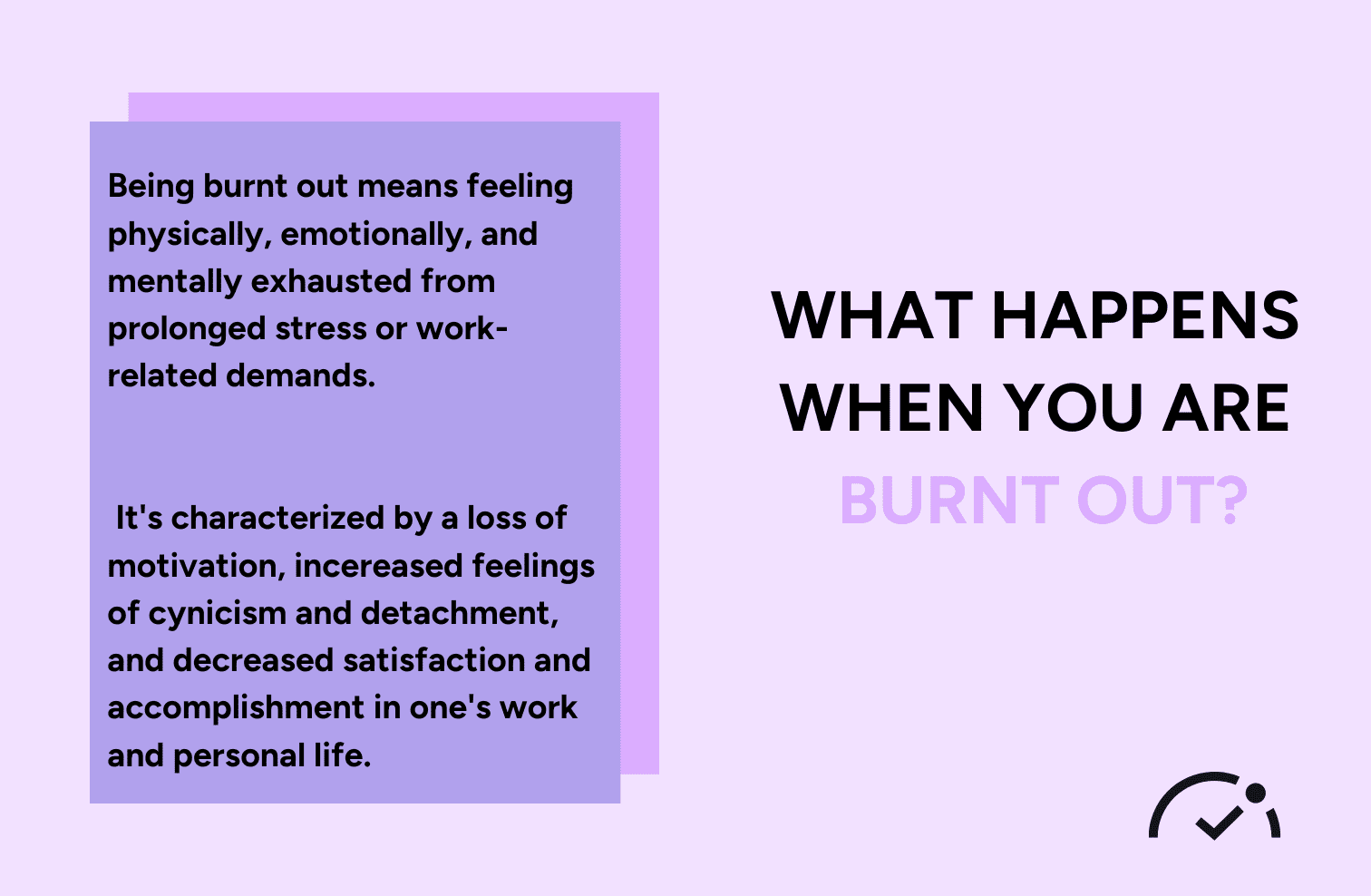
Job burnout: Having little or no control
Having no control and being frustrated at work might contribute to job burnout. Individuals can feel disengaged and stressed when they have little control over how their job is done, what duties they are allotted, or what their work schedule looks like.
To avoid burnout, it is critical to have some influence over one's work, such as setting reasonable goals, receiving regular feedback and communication from management, and maintaining a balanced workload. Finding possibilities for personal and professional improvement, if possible, can also assist in increasing job satisfaction and minimizing burnout.
What is physicial burnout?
Physician burnout is a state of physical, emotional, and mental weariness produced by long-term stress in the medical field. It can lead to decreased job satisfaction, higher medical errors, and lower patient care quality.
Long working hours, severe tasks, a lack of control over work-life balance, and insufficient support from colleagues and organizations are among the causes. Solutions include a better work atmosphere, better time management, peer and superior support, and engagement in extracurricular activities.
Importance of understanding burnout
For a number of reasons, it is crucial to comprehend burnout and its causes. Burnout, first and foremost, can have negative effects on a person's mental and physical health. Numerous detrimental health effects, such as depression, anxiety, cardiovascular disease, and immune system dysfunction, may result from it. Burnout can potentially be fatal in extreme circumstances.
Burnout can have detrimental effects on a person's health in addition to having serious repercussions for an organization. Employee burnout can result in lower production, more absenteeism, and a greater turnover rate. This could have a detrimental knock-on effect on the entire company, resulting in lower profitability and a toxic work environment.
Finding solutions to avoid and treat burnout requires a thorough understanding of the phenomenon. Individuals and organizations can minimize stress and enhance general well-being by taking proactive measures to identify the signs and causes of burnout. Setting limits, looking for assistance, and implementing stress-reduction strategies are some examples of this.
In general, preserving the health and well-being of both individuals and organizations depends on having a solid grasp of burnout. We can improve the mood and productivity of the workplace by identifying the symptoms and adopting proactive measures to prevent and manage the
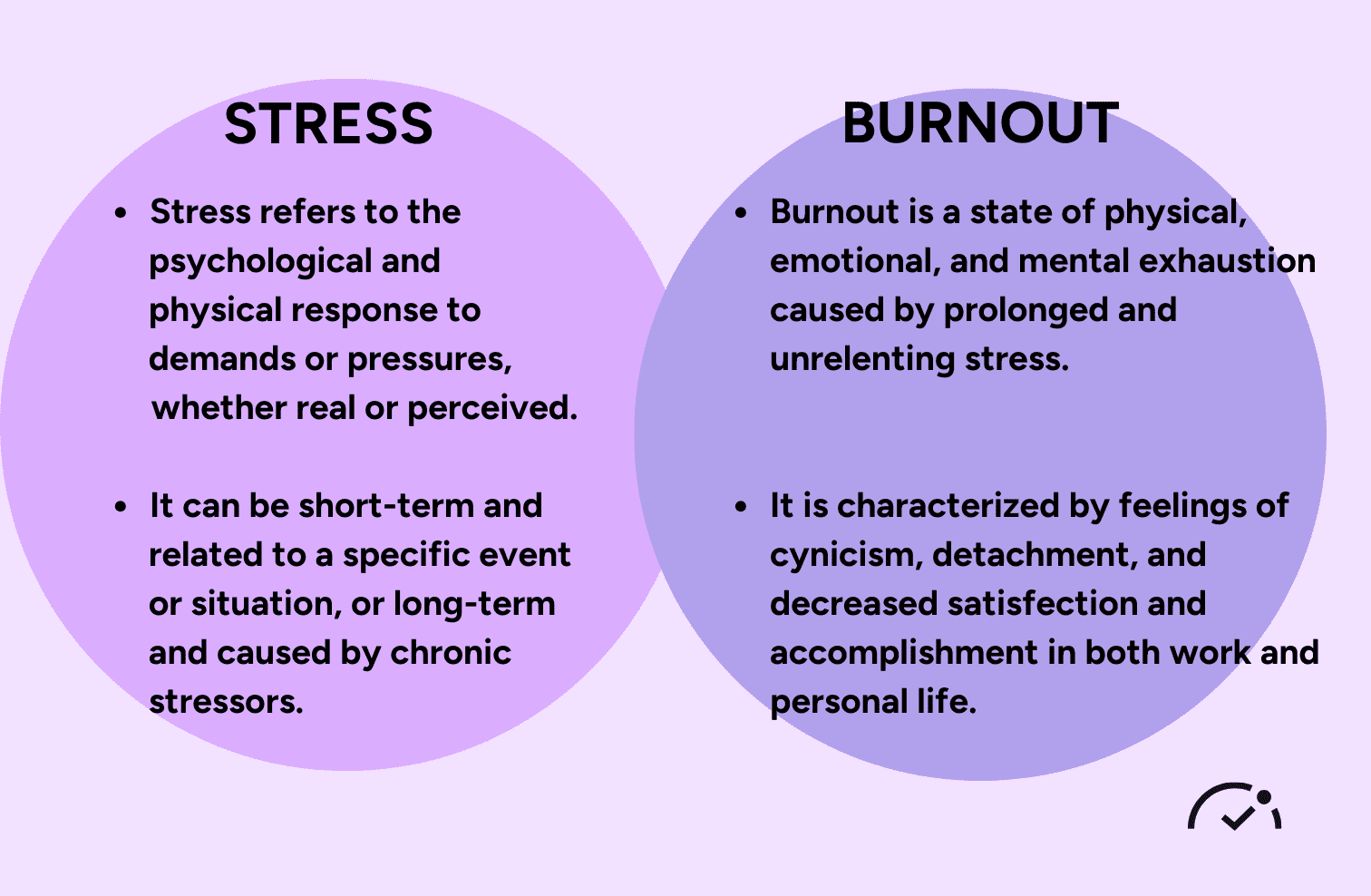
The Difference Between Stress and Burnout
Stress is the body's and mind's reaction to perceived expectations or pressure. It is a common and natural reaction to stressful or hazardous situations and can be triggered by a variety of factors such as work, relationships, health challenges, or financial concerns.
It is your body's way of protecting you from danger however it can have negative effects as well. When you are stressed, your body goes into "fight or flight" mode, producing hormones such as cortisol and adrenaline to help you deal with the stressor. Prolonged or acute stress, on the other hand, can be detrimental to both physical and mental health.
On the other hand, burnout is a condition brought on by persistent stress and is characterized by physical, mental, and emotional depletion. A tremendous workload, a loss of control, and a lack of social support are just a few of the factors that might contribute to it at work and in the individual's personal life. People that are burnt out may come out as aloof, cynical, and less motivated at work.
Why is Burnout Relevant Now?
Burnout is relevant now because it has become a growing concern in many industries, particularly in the current work environment, where remote work and the COVID-19 pandemic have added additional stress and challenges to the workplace.
With the blurring of boundaries between work and personal life, individuals are feeling increasing pressure to be always "on" and perform at high levels. This has led to increased rates of burnout, particularly among essential workers and those in high-stress industries.
The consequences of burnout can be severe, affecting both individuals and organizations, and it's important to address burnout proactively to prevent its negative impact
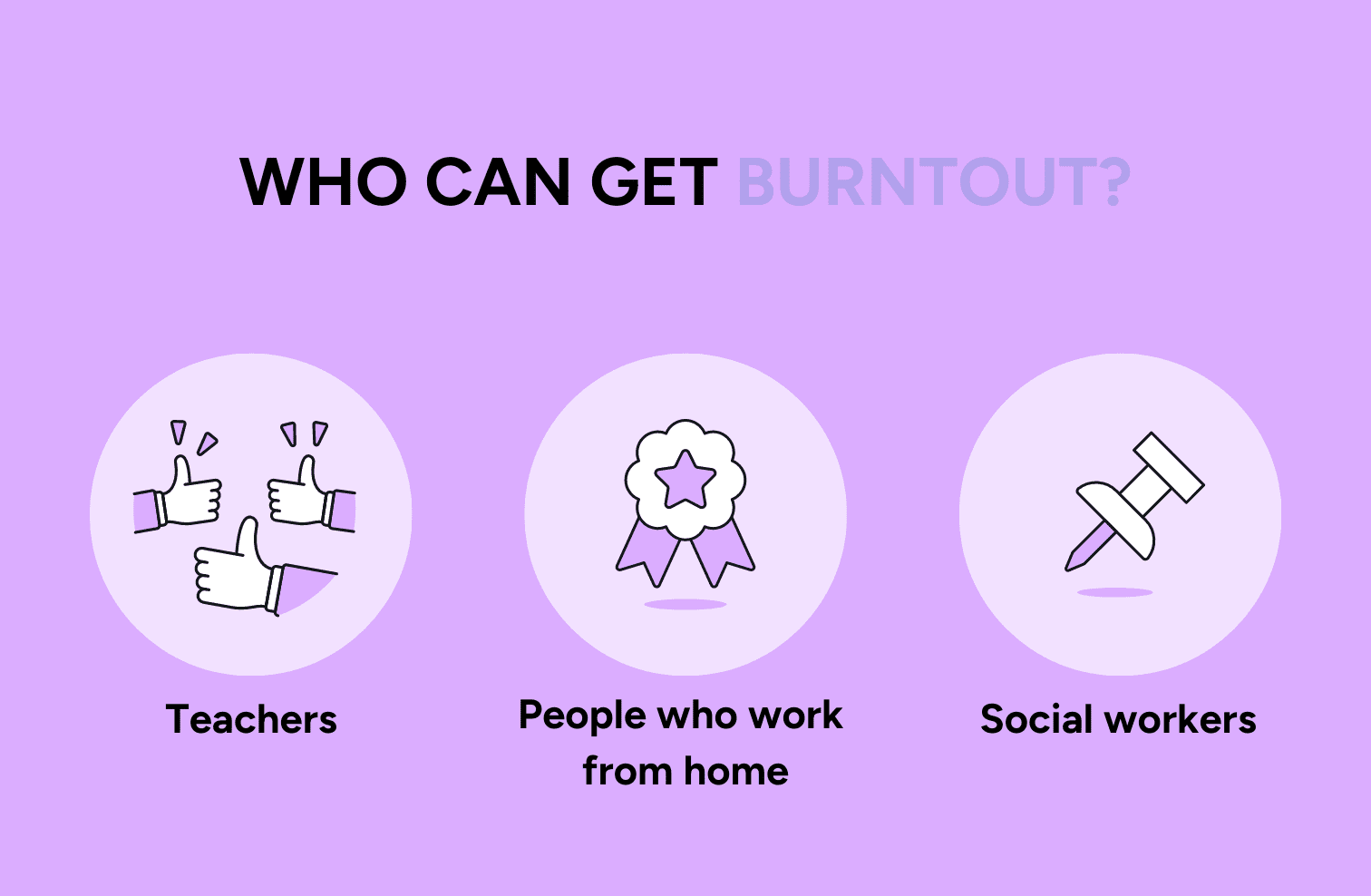
When Does Burnout Set In?
Burnout may affect anybody, regardless of what they do for a livelihood or the industry in which they work. People who are under constant stress, have a lot of work to accomplish, or have little influence over their careers are more likely to burn out.
Furthermore, teachers, social workers, and healthcare employees are more prone to feel burned out because their occupations are difficult and require a lot of emotional effort.
Burnout can also occur in persons who work from home or in the gig economy because there is no clear divide between work and personal life and there is little support or structure at work. This means that you must avoid stress as much as possible. It may not sound realistic much for many of us but it is possible to decrease stress to a minimum and have a life-work balance.
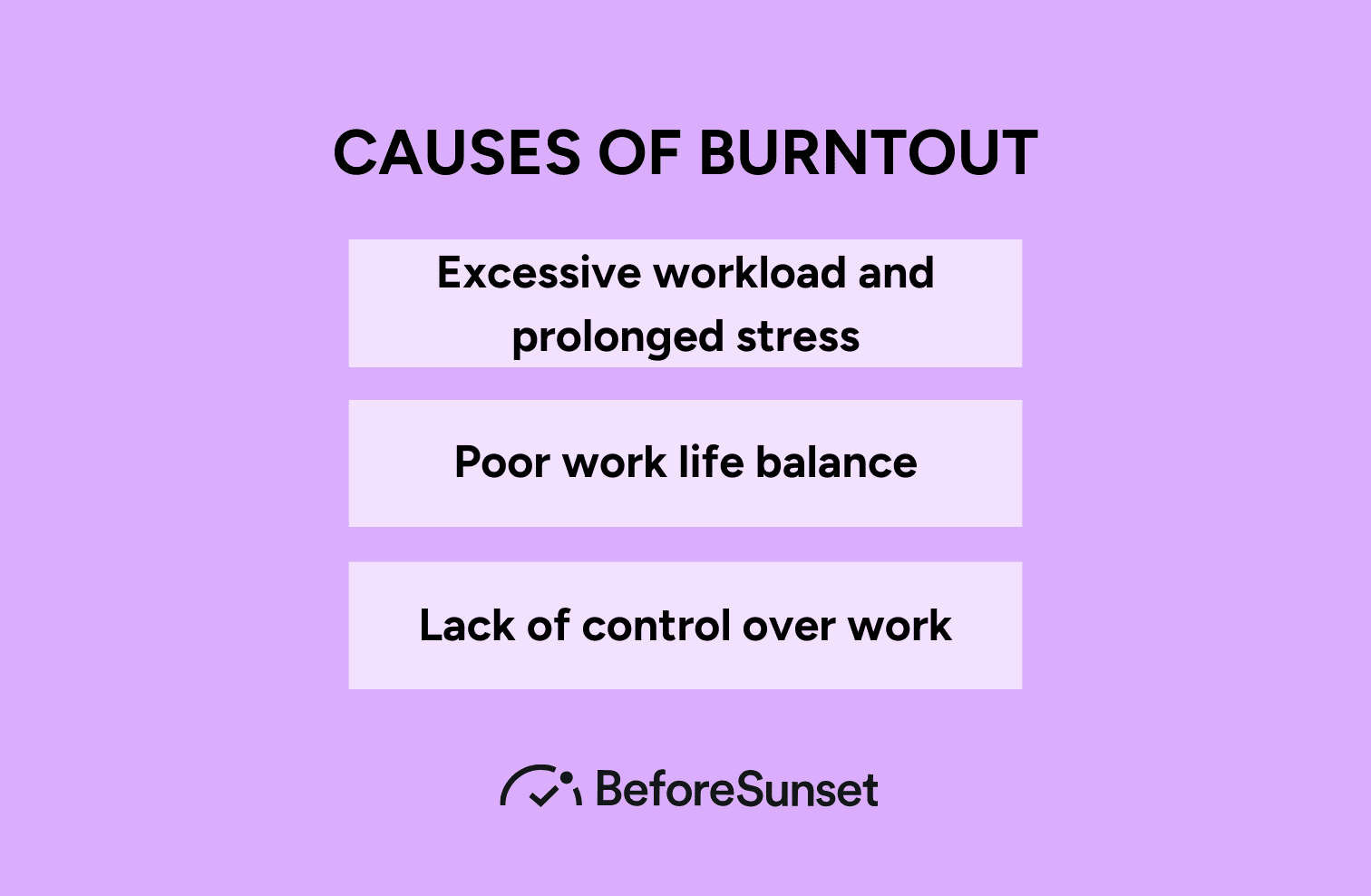
Symptoms of Burnout
Symptoms of burnout can vary from person to person, but there are several common signs to look out for.
Physical exhaustion: Even after a restful night's sleep, it is characterized by a persistent sense of lethargy and a lack of vitality. Physically worn-out individuals could struggle to finish daily duties and might be more prone to disease.
Emotional exhaustion: It is defined by a loss of excitement or motivation as well as a sense of being emotionally spent. People who are emotionally spent may feel overpowered, agitated, and unable to handle stress. They might also experience issues with inadequacy or a lack of accomplishment.
Detachment or cynicism: It is characterized by a feeling of disconnection or detachment from work or other activities. People who are experiencing detachment or cynicism may feel apathetic or disinterested in their work and may have a negative or cynical attitude towards their job or colleagues.
Decreased productivity: People who are experiencing burnout may find it difficult to concentrate, complete tasks, or meet deadlines. They may also make more mistakes or have a lower quality of work.
Ultimately, burnout symptoms can have a negative impact on an individual's well-being and job performance. It is critical to detect the indicators of burnout and take preventative and management measures. Setting limits, seeking help, and implementing stress-reduction practices are some examples.
What Are The 7 Signs Of Burnout?
Chronic physical and emotional tiredness coupled with emotions of cynicism and disengagement from one's work is known as burnout. These seven indicators point to burnout:
Exhaustion: Even after a restful night's sleep, a persistent sense of exhaustion and low energy are frequently indicative of burnout. Experiencing both physical and mental fatigue might make it difficult to do everyday duties.
Cynicism and Detachment: One of the main signs of burnout is a developing sense of pessimism and cynicism about one's job and coworkers. People could experience emotional detachment, loneliness, and disengagement from their workplace.
Decreased Performance: Workplace performance might suffer as a result of burnout. People could find it difficult to fulfill deadlines, commit more errors, and see an overall decline in efficiency and production.
Lack of Motivation: Burnout frequently leads to a diminished feeling of drive and achievement. Activities that used to be enjoyable might becoming tedious or burdensome.
Increased Irritability: Burnout may show itself as heightened irritability, annoyance, or impatience. People can discover that they are responding more adversely to coworkers, clients, or circumstances that they would not have been upset by in the past.
Physical Symptoms: Burnout may be accompanied by physical symptoms such headaches, sore muscles, and irregular sleep patterns. Prolonged stress can have a negative impact on the body and cause a range of medical symptoms.
Cognitive Difficulties: Burnout can impair one's ability to concentrate, remember things, and make decisions. It might be difficult for people to remain attentive and involved in their work.
Causes of Feeling Burnout
There are several factors that can contribute to burnout, including work-related, personal, and environmental ones.
Work-related factors that can contribute to burnout include high demands, a lack of control, and a lack of support. For example, if an individual has a high workload with tight deadlines and limited resources, they may be more prone to burnout. Similarly, if an individual has little control over their work or a lack of support from their colleagues or manager, they may be more at risk for burnout.
Burnout can also result from personal issues. For instance, burnout may be more likely in people with perfectionistic personalities because they may have unreasonable standards for both themselves and their work. Similar to how a poor work-life balance can lead to burnout, people who don't get enough downtime may be more prone to stress and tiredness.
Burnout may also be influenced by environmental variables, such as toxic workplace culture. An individual may be more prone to burnout if they operate in a hazardous or unfavorable environment. Conflicts with coworkers, a lack of clear objectives or goals, or a lack of praise or acknowledgment are a few examples of this.
A combination of factors from the workplace, the individual, and the environment can lead to burnout. To effectively prevent and treat burnout, it is essential to comprehend its precise causes
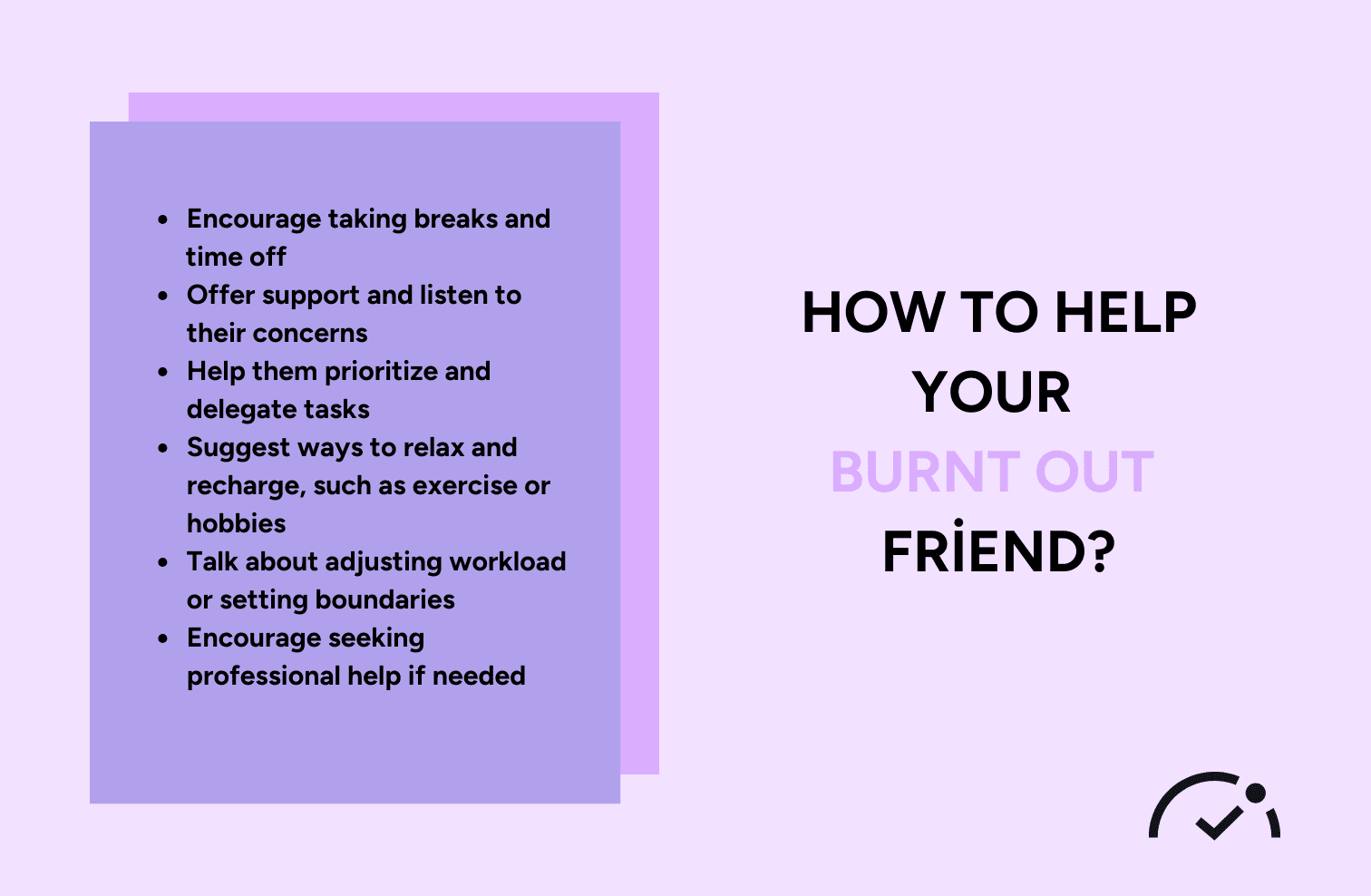
What to Do When Feeling Burned Out?
If your loved one or a coworker is feeling burnt out there are multiple ways to help them out. But why should you help them out? Because burnout can have a severe effect on a person's personal life, leading to interpersonal problems and a lack of overall life satisfaction.
Burnout can, in extreme situations, result in sadness, anxiety, and other mental health issues. Physical symptoms of burnout include exhaustion, trouble sleeping, and a weakened immune system, which increases susceptibility to sickness.
Burnout can have a significant and long-lasting toll, making it crucial to spot the symptoms and take preventative and management measures.
When it comes to sharing the toll burnt out takes you can try these steps:
Encourage taking breaks and time off
Encourage a buddy who is feeling burned out to take breaks and time off if you know they need it. Encourage them to take a break from their work and give self-care a first priority. Suggest a weekend excursion, a hike, or some other stress-relieving activity.
Remind them that taking a break would not only enhance their physical and mental well-being but also enable them to return to their jobs feeling renewed and recharged. Encourage them to arrange a vacation and hold them responsible for carrying it out.
Remind them that taking care of themselves not only enhances their overall well-being and productivity at work but also encourages them to communicate their boundaries and needs to their coworkers and superiors.
Offer support and listen to their concerns
It's crucial to provide support and pay attention to your friend's worries if they are feeling burned out. Start by giving them your whole attention while listening to them empathically and without passing judgment.
Recognize their emotions and demonstrate your understanding of their circumstance. Encourage them to take pauses and take care of themselves in order to reduce their stress and fatigue. Be there for them, offer assistance, but also respect their judgments and boundaries.
Offer assistance from a mental health professional or other services if they require more support. You may assist your friend in overcoming burnout and regaining their energy and sense of wellbeing by being a helpful friend.
Help them prioritize and delegate tasks
Helping your friend prioritize and assign duties will help them feel less stressed and overwhelmed if they are feeling burned out. Asking them to list all of their present obligations and responsibilities is a good place to start.
Encourage them to prioritize the most crucial chores, and then suggest assigning or postponing less crucial ones. Describe the value of self-care and taking breaks as necessary. It could also be beneficial to find someone else who can assist you or offer your own assistance in completing specific chores.
The objective is to relieve your friend's stress and workload so they can concentrate on crucial duties and regain control over their workload. Together, you can prioritize and assign chores so that your friend can manage their stress and stay motivated.
Suggest ways to relax and recharge, such as exercise or hobbies
If your friend is feeling burnt out, it is important to suggest ways to relax and recharge their batteries. Encouraging them to participate in physical activity, such as exercise, can help reduce stress and boost their mood.
Suggest activities that they enjoy and that have a calming effect, such as yoga, meditation, or a walk in nature. Hobbies and creative pursuits, like painting or playing an instrument, can also provide a much-needed break from the daily grind and help them recharge.
Remind your friend that taking time for themselves is not selfish, but rather a necessary aspect of self-care. Offer to join them in these activities or simply be there to support them.
Talk about adjusting workload or setting boundaries
If your friend is feeling burnt out, it's important to talk about adjusting their workload or setting boundaries. Start by asking them about the source of their burnout and the specific tasks or responsibilities that are causing the most stress.
Together, you can explore potential solutions for reducing the workload, such as delegating tasks, adjusting schedules, or setting limits on available time and energy. Emphasize the importance of clear and realistic boundaries, both at work and in personal life, to avoid overextending themselves and maintain a healthy work-life balance.
If necessary, encourage your friend to have an open and honest conversation with their employer or colleagues about their workload and any changes that need to be made.
By addressing the root cause of burnout and finding ways to adjust their workload and set boundaries, your friend can regain control over their workload and reduce their stress levels.
Encourage seeking professional help if needed
Encourage your friend to get professional assistance if necessary if they are feeling burned out. Remind them that asking for assistance is a show of strength and a proactive move in the direction of improved mental health. Help them locate services, such as a therapist or counselor, and offer to support them in doing so.
Make the procedure as simple and available as you can. Describe how mental health experts can offer specialized methods and coping mechanisms to aid with burnout since they are equipped to do so. Insist on the value of maintaining their mental health and the advantages it can have for all facets of their lives.
Remind your buddy that they are not alone and that millions of people successfully obtain treatment for mental health concerns each year if they are afraid or unsure about asking for assistance.
Treatment of Burnout: How to Feel Better?
There are several strategies that can be effective for preventing and managing burnout.
One key strategy for preventing burnout is setting boundaries. This can include setting limits on the amount of work that is taken on, setting aside dedicated time for rest and relaxation, and learning to say no when necessary. It can also involve setting boundaries with technology, such as disconnecting from work emails outside of working hours or taking regular breaks from social media.
Another crucial tactic for managing and preventing burnout is to seek support. This could entail turning to friends and family for assistance, joining a support group, or getting professional aid for your mental health. An individual can discover the root causes of their burnout and create coping mechanisms with the assistance of a mental health professional, such as a therapist or counselor.
Additionally, there are a number of methods that can be used to manage burnout. These could include physical pursuits like exercise or outdoor activities, as well as stress-relieving practices like deep breathing, meditation, or yoga. Getting enough sleep, maintaining a good diet, and discovering stress management strategies are further methods for managing burnout.
As a result, finding a balance between work and home life is critical, as is employing tactics and approaches that can aid in the prevention and management of burnout. Individuals and organizations can create a more positive and productive work environment by taking proactive actions to minimize stress and improve well-being.
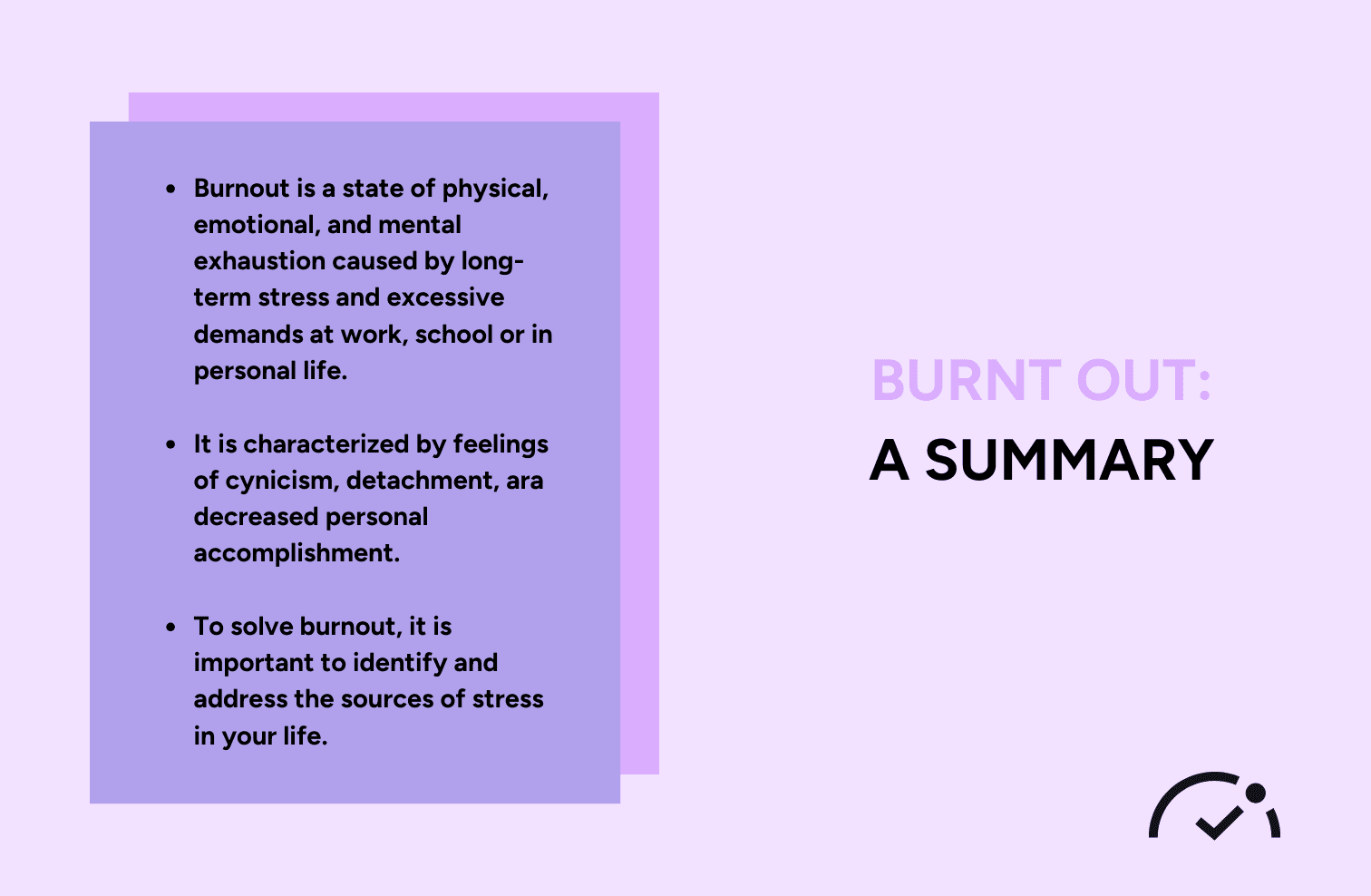
Tips For Managing Burnout
In conclusion, burnout is a common and serious issue that can have negative consequences for both individuals and organizations. It is characterized by physical, emotional, and mental exhaustion caused by excessive and prolonged stress.
Symptoms of burnout include physical exhaustion, emotional exhaustion, detachment or cynicism, and decreased productivity.
It is important to understand the definition, causes, symptoms, and treatment of burnout in order to prevent and manage it effectively. Strategies for preventing burnout include setting boundaries, seeking support, and adopting stress-reduction techniques.
Techniques for managing burnout may include relaxation techniques, seeking help from a mental health professional, getting enough sleep, eating a healthy diet, and finding ways to manage stress.
Burnout is a common and serious issue that can have serious consequences for both individuals and organizations. By understanding the definition, causes, symptoms, and treatment of burnout, we can take proactive steps to prevent and manage it effectively.
Why We Should Be Empathetic Towards People Experiencing Job-Related Burnout
Empathy towards individuals facing job-related burnout is crucial for fostering a supportive and understanding work environment. Recognizing the mental health condition and emotional health struggles of colleagues can lead to better health choices and overall improved health status. Here are several reasons why empathy is essential:
Understanding Health Conditions: People experiencing burnout often have underlying health conditions that need attention and care. Being empathetic helps in acknowledging and addressing these issues.
Supporting Mental Health: Empathy can significantly impact a person's mental health condition, providing them with the emotional support needed to navigate their challenges.
Encouraging Healthy Choices: When we show empathy, we encourage others to make better health choices and engage in activities that promote their well-being.
Recognizing Energy Limits: Acknowledge that everyone has different amounts of energy and that reaching one's kinetic energy threshold can lead to burnout. Understanding this helps in managing workloads and expectations better.
Benefits of Empathy:
Life Span Impact: Addressing burnout empathetically can positively affect an individual's overall life span by promoting healthier living conditions.
Paradox of Life: Understanding the paradox of life, that balancing work and personal life is a continuous challenge, helps in creating realistic and supportive work policies.
Source of Energy: Recognize that work should not be the only source of energy and that employees need time to recharge and engage in other fulfilling activities.
Contact with Health Services: Empathy fosters a culture where seeking contact with health services is normalized and encouraged, ensuring that employees get the help they need.
Pleasing People: Reducing the pressure of constantly pleasing people allows for a more genuine and balanced approach to work relationships.
Being empathetic towards those suffering from job-related burnout is not just about supporting their immediate needs but also about fostering a healthier, more sustainable work environment for everyone.
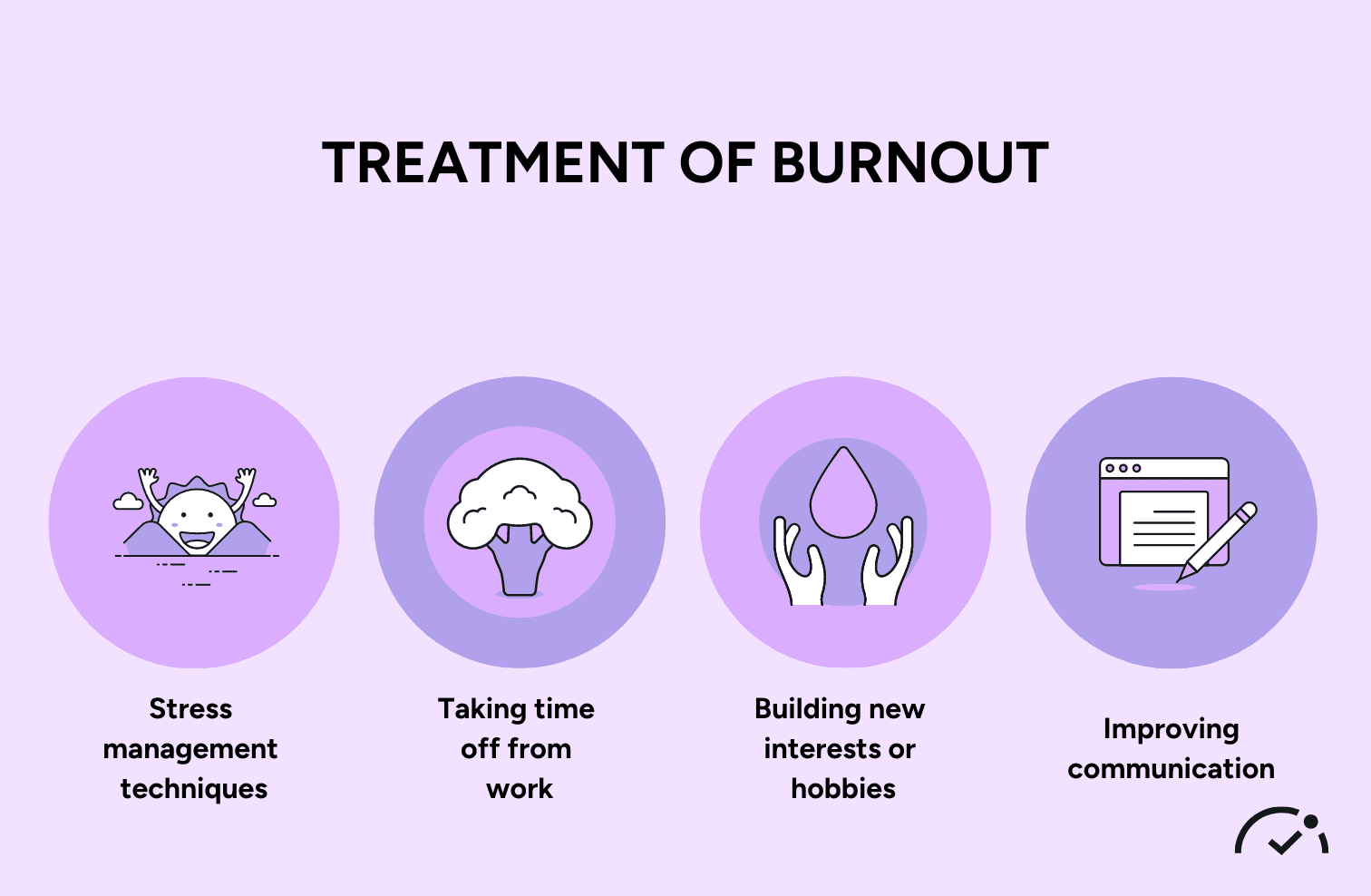
Recognizing and Combating Feelings of Burnout: Reclaim Your Energy and Thrive
Burnout. It's a word tossed around frequently, but what exactly is it, and how do we identify it in ourselves or others?
Burnout is a state of emotional, physical, and mental exhaustion caused by chronic stress. It's not simply feeling tired after a long day; it's a prolonged state of exhaustion that permeates all aspects of life, impacting daily lives, energy levels, and even risk for depression and anxiety.
Common burnout factors include:
Career stress: Job stress, chronic stress, and work-life imbalance are significant contributors to burnout.
High workload: Feeling overwhelmed and constantly under pressure can lead to feelings of job burnout.
Lack of control: Feeling unable to influence your workload or work environment can exacerbate stress and contribute to burnout.
Lack of support: Feeling isolated and unsupported at work can significantly increase the risk of burnout.
Physicians and other professions with high levels of emotional labor are particularly susceptible to burnout rates due to the demanding nature of their work.
Examples of burnout can manifest in various ways, including:
Cynicism: Detachment from work and a loss of enthusiasm or passion for your profession.
Reduced sense of accomplishment: Feeling ineffective and questioning your abilities, despite putting in significant effort.
Emotional exhaustion: Feeling constantly drained and emotionally depleted.
Loss of energy: Experiencing endless exhaustion that interferes with personal and professional life.
Neglecting self-care: Withdrawing from hobbies, social activities, and healthy habits that once brought you joy and relaxation. Medical conditions may even be affected
Recognizing the signs of burnout is crucial to preventing its negative consequences on your well-being and satisfaction.
Combating burnout requires a multi-pronged approach:
Identify and address the source of stress: Whether it's an unmanageable workload, lack of support, or an unhealthy work environment, addressing the root cause is essential.
Prioritize self-care: Engage in activities that nourish your mind, body, and spirit. This can include exercise, spending time in nature, connecting with loved ones, or pursuing hobbies.
Set boundaries: Learn to say no and establish healthy boundaries between work and personal life.
Seek support: Talk to a therapist, counselor, or trusted friend.
Remember, burnout isn't a character flaw; it's a response to chronic stress. By recognizing the signs, taking action to address the root causes, and prioritizing self-care, you can reclaim your energy and create a satisfied life that fuels you, not drains you.
Conquering Chaos: How Keystone Habits Unlock Productivity and Well-Being
We all have creatures of habit within us. But what if we could harness the power of habit to not just share responsibilities and become more productive, but also improve our overall well-being? Enter the concept of keystone habits.
Keystone habits are small, consistent actions that have a ripple effect on other areas of your life. Think of them like the keystone in an arch – holding everything else together. By focusing on building self-care habits like getting enough sleep, exercising regularly, and eating healthy, you can unlock a cascade of positive changes:
Increased productivity: When you're well-rested, energized, and focused, you're naturally better equipped to tackle tasks and achieve goals.
Reduced stress: Taking care of yourself physically and mentally helps you manage stress more effectively, preventing burnout and cynicism.
Improved mood: Healthy habits can boost your mood and overall sense of well-being, reducing the risk of anxiety and depression.
But what if you're not a "morning person" or struggle with sleep deprivation? Don't despair! The beauty of keystone habits is that they can be tailored to your type of person and lifestyle.
Here are some examples:
The "Night Owl" Approach: If mornings are a struggle, focus on establishing a consistent sleep schedule, even on weekends. Prioritize winding down activities before bed and create a relaxing bedtime routine to ensure quality sleep.
The "Busy Bee" Approach: If you juggle multiple responsibilities, focus on sharing responsibilities and delegating tasks whenever possible. Utilize technology and tools to streamline your workflow and automate certain tasks.
Remember, lack of balance can lead to burnout and hinder long-term productivity. By identifying your unique needs and building keystone habits that support your well-being, you can unlock a more productive and fulfilling life.
How Can BeforeSunset AI Help You?
BeforeSunset AI can help eliminate burnout by providing insight into how your are spending your time and where you may be overextending yourself. By keeping track of the time spent on various tasks and activities, it becomes easier to identify patterns and areas where adjustments can be made to create a more balanced and sustainable workload.
BeforeSunset AI can also help you understand where you may be wasting time and make adjustments to be more efficient.
What are you waiting for? Use today.
